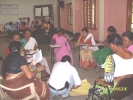Capacity building training of ASHAs and ANMs on Family Planning and Reproductive Health: A report
A two day capacity building training for ASHAs and ANMs on family planning and reproductive health was organized at Dibrugarh’s St Xavier’s School on June 15 and 16, 2010. The training was part of the Population Foundation of India (PFI) supported C-NES project to popularize the concept of family planning among the Brahmaputra river island communities inhabiting five of the ten Boat Clinic districts in Assam -Dibrugarh, Tinsukia, Dhemaji, Lakhimpur and Sonitpur. The objective of the training was to promote capacity building on family planning and reproductive health issues, imparting a clear concept on family planning, methods involved, effective counseling skills for better community response and to make the participants capable of facing community queries.
There were 52 participants from Dhemaji, Dibrugarh and Tinsukia at the training including the respective district family planning counselors, ICDS workers, Asha facilitators, community workers and general participants. Community Workers and ICDS workers were included in the training since they perform similar functions (as those of ASHAs) in remote islands where ASHAs are not available.
Welcoming the participants, Manik Ch. Baruah, Assistant Programme Manager, C- NES talked about the organizations objective of working for the welfare of the vulnerable and marginalized river island communities through the innovative Boat Clinic health outreach and its right based approach. He also mentioned about the objectives of the PFI supported family planning project and how Maternal Mortality Rate (MMR) and Infant Mortality Rate (IMR) could be minimized and living standards improved through adopting family planning mechanisms.
Manisha Buragohain, District Programme Manager, NRHM, Dibrugarh was present at the training wherein she focused the main objectives of NRHM and the importance of adopting family planning mechanisms, highlighting the facilities provided by the government under NRHM to promote family planning.
Dr. D.N Bangthai, Joint Director, Health and Family Welfare, Dibrugarh spoke on Reproductive Tract Infection (RTI) & sexually transmitted infection (STI) and the necessary preventive measures to be taken including the need to use contraceptives at the training.
Chandana Bora, State Advocacy & FP Coordinator, C-NES spoke on health and nutrition highlighting the main causes of malnutrition – poverty, illiteracy, ignorance, negligence, infection, large family size, faulty food habits since women in the north eastern region suffer from chronic malnutrition and anemia, often resulting in serious complications during pregnancy and child birth.
Participants were divided into groups to develop IEC material like songs, skits, slogans, posters with relevant family planning themes based on local folk songs, dances and traditional beliefs to be used for mobilizing communities, generating support in popularizing family planning among the communities living in the islands.
Participants shared their field experiences on family planning issues, the challenges faced while counseling eligible couples and distributing contraceptives. Some of the challenges mentioned were religious beliefs and superstition, inhibitions, illiteracy, remoteness and social barriers. The participants provided feed back on what would appeal best to the community for promoting family planning measures. The challenges listed by the participants and workable solutions to them were discussed given the constraints of educating and bringing about a mind set change in an isolated community inhabiting remote areas with no access to modern amenities and basic needs. Success stories of community motivation were shared to encourage the participants.






